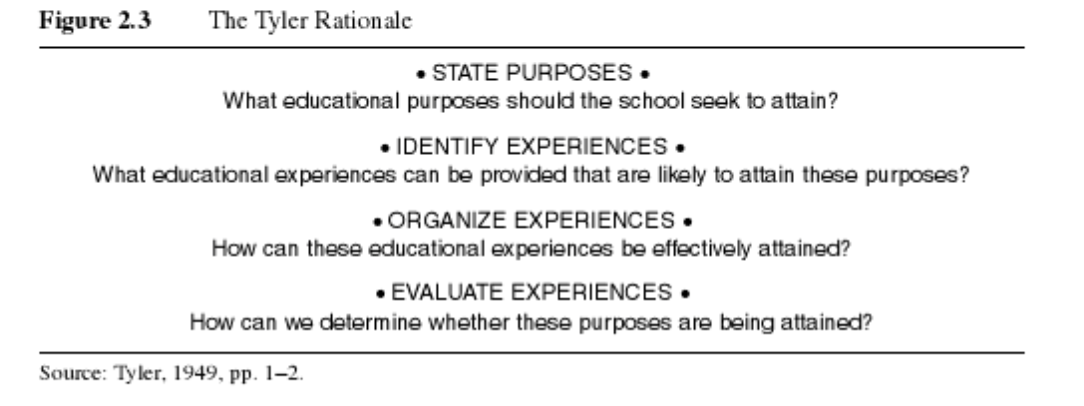- Respond in your blog to the following writing prompt: Curriculum development from a traditionalist perspective is widely used across schools in Canada and other countries. Can you think about: (a) The ways in which you may have experience the Tyler rationale in your own schooling? (b) What are the major limitations of the Tyler rationale? (c) What are some potential benefits?
This week I had to do some readings on the development of the Curriculum and about one particular person who really “pioneered” the way we develop curriculums today. This person was named Ralph Tyler, he developed a way to help the curriculum really start to make sense and actually work when it comes to teaching students, here is a picture from the document of the steps that Tyler developed to help jump start the proper way to make a Curriculum.

From The picture above you can see what in the reading they called the Tyler Rationale, it is very clear and organized as to what needs to be done in order to relay information correctly to students. Now one of the guiding questions was relate my experience to the Tyler rationale, now my high school experience was normal I would say, my teachers would follow the curriculum but not fully, there was always that if we have time we will get to it excuse. I guess with the identify experience section, in my high school the educational experience lacked, my high school only had a couple classes that really prepared me for the next level of schooling otherwise my classes were laid back and my study habits were weak. So that is something that affected me when I first got into university.
My high school however was very organized and did a good job to keep us as students organized, by having a special period which we called TAG which is like homeroom, but we had the same teacher for all four years and every two years we actually got a credit for that class, TAG was used to relay any information and help us out with homework, if there was a problem with us in a class the teacher would complain to the TAG teacher instead of the principal, all of this really helped us as students stay organized and in the now. The evaluation was pretty much the same however we did have a earned option program where if we maintained a certain mark and other criteria than we would not have to write the final exam for that class, it was only for the sciences at the time but now it is for overcalls.
Another question being asked is what are some limitations that the Tyler rationale has. Now after reading the two documents it was very hard in my opinion to find out limitations if any, they speak very highly of the rationale in the readings and if I had to say any limitations there is, one might be the fact that it is only the groundwork for building a curriculum, he did not really give anything else to add into the curriculum he just gave us what the curriculum should be and allowed people to build off of that. Otherwise there really is no limitations its very broad and open and allows for moderations to his rationale and allows open interpretation of his rationale to allow growth.
Lastly, what are some benefits of Tyler’s Rationale, I guess some benefits could be just how simplistic it can be, but yet at the same time it’s very abstract and allow others to implement their own ideas, but by using Tyler’s rationale as a guideline or base when it comes to planning or creating a curriculum. Another benefit could be the whole “experiencing” it aspect of the curriculum could be a big benefit because I never thought of experiencing the curriculum and I think that could really help a teacher think of new ideas and experience teaching and learning in a new way.